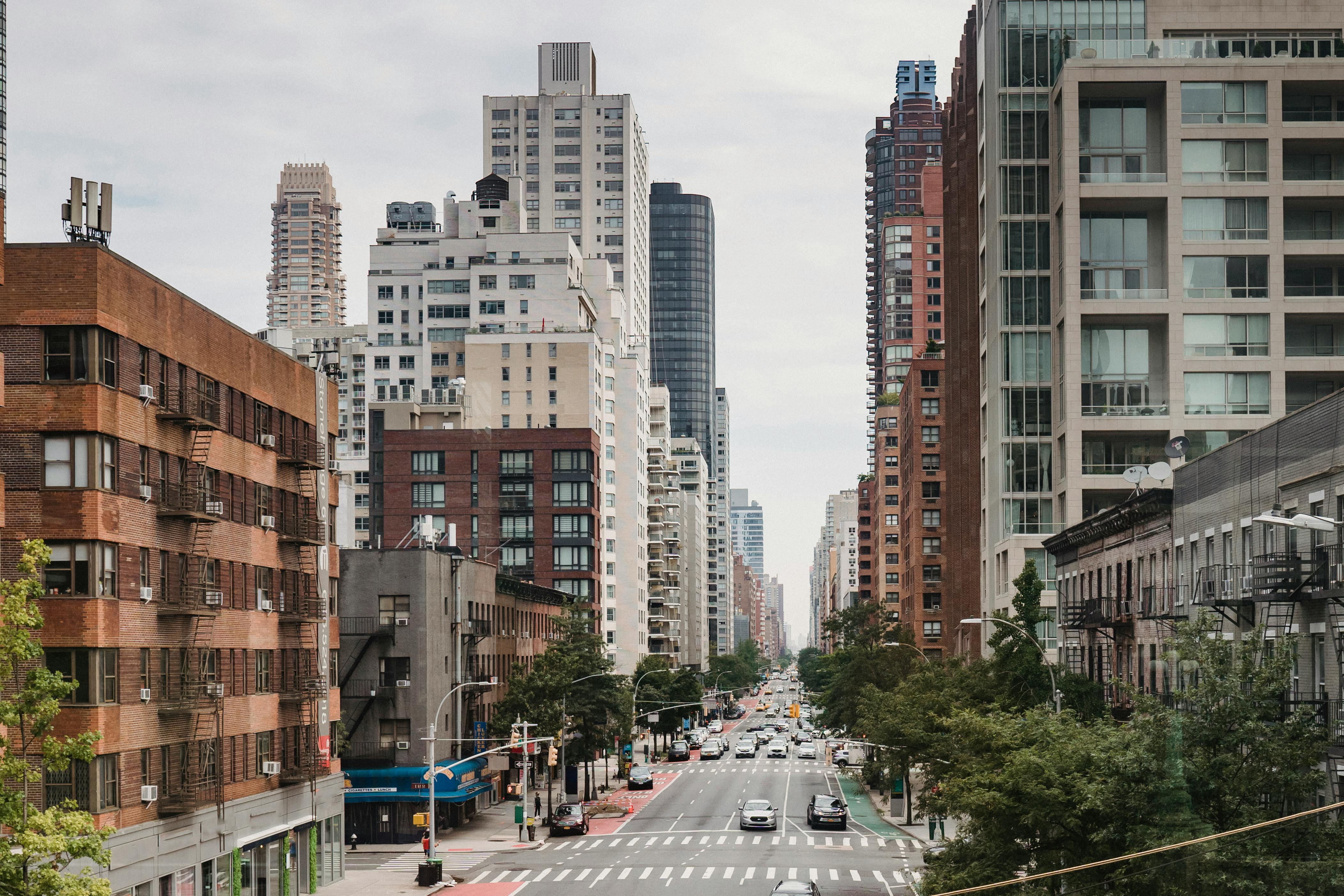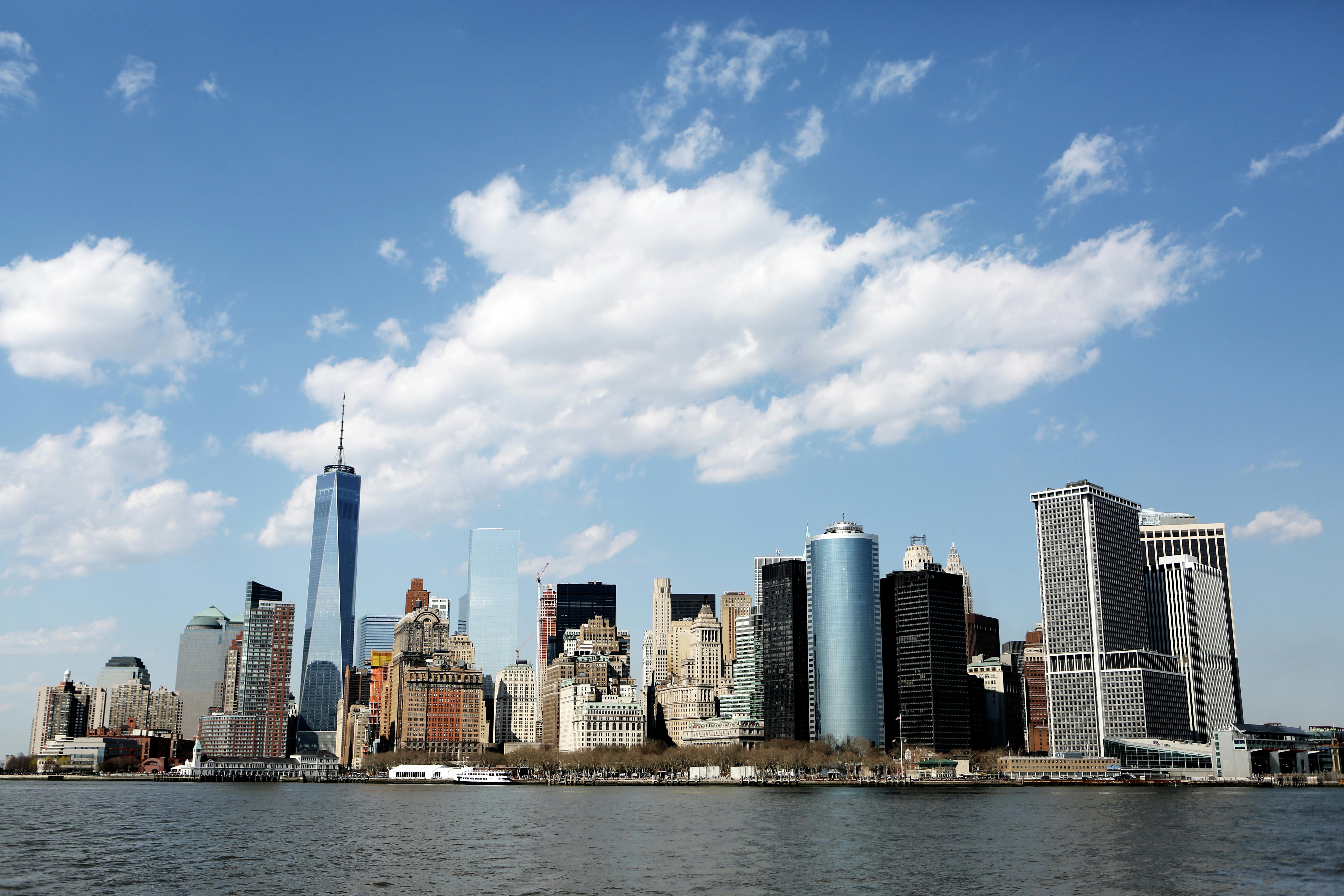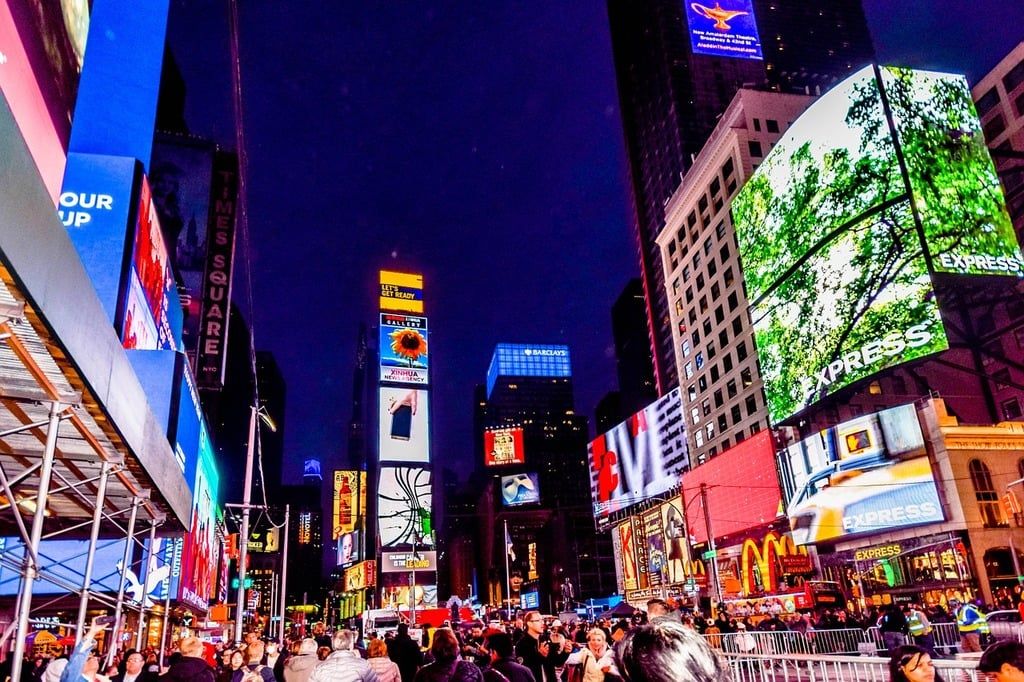The bright lights of Broadway, the hustle and bustle of Times Square, the serene expanse of Central Park - New York City has long captured the imagination of people worldwide, including many Brits dreaming of a new life across the pond. Moving to New York from the UK is an exciting prospect, filled with opportunities for personal and professional growth. However, relocating to one of the world's most dynamic cities also comes with its fair share of challenges and considerations.
At Deliver1 we’ve moved countless people from the UK to NYC. From navigating the complexities of US visa requirements to finding your perfect apartment in the city that never sleeps, we've got you covered. Whether you're moving for work, study, or simply to embrace the unique energy of New York, this article will help make your UK to USA move a success.
Understanding Visa Requirements
The first step in your journey to New York begins with understanding and navigating the U.S. visa system. As a UK citizen, you'll need to obtain the appropriate visa or permit to live and work in the United States. The type of visa you need depends on your purpose for moving to New York, whether it's for work, study, or other reasons.
Types of Visas
- Work Visas:
- H-1B Visa: For specialised occupations requiring a bachelor's degree or higher.
- L-1 Visa: For intracompany transferees.
- O-1 Visa: For individuals with extraordinary ability or achievement.
- Student Visas:
- F-1 Visa: For full-time students at accredited U.S. colleges or universities.
- J-1 Visa: For exchange visitors, including some students and researchers.
- Green Card:
- Permanent Resident Card: Allows you to live and work permanently in the U.S.
- Can be obtained through employment, family sponsorship, or the Diversity Visa Program.
- Investor Visa:
- E-2 Visa: For investors making a substantial investment in a U.S. business.
Visa Application Process
- Determine the appropriate visa category for your situation.
- File a petition with U.S. Citizenship and Immigration Services (USCIS), if required for your visa type.
- Complete the online visa application (DS-160 form).
- Pay the visa application fee.
- Schedule and attend an interview at the U.S. Embassy in London or the Consulate General in Belfast.
Remember, visa regulations can change, so always check the U.S. Department of State website for the most up-to-date information.
Get a
Free Quote
in seconds
Moving has bever been this simple with Deliver1
Finding Accommodation in New York
Finding the right place to live in New York City can be both exciting and challenging. The city's diverse neighbourhoods each offer their own unique charm and atmosphere, from the brownstones of Brooklyn to the skyscrapers of Manhattan. However, the New York housing market is known for its competitiveness and high costs, so it's essential to be well-prepared and act quickly when you find a place you like.
Neighbourhoods
New York City consists of five boroughs, each with its own character:
- Manhattan: The heart of NYC, known for its iconic skyline and attractions.
- Brooklyn: Hip and diverse, with a thriving arts scene and beautiful brownstones.
- Queens: The most ethnically diverse urban area in the world, with great food and culture.
- The Bronx: Home to the New York Yankees and the real Little Italy.
- Staten Island: The most suburban of the boroughs, accessible by ferry.
Popular neighbourhoods for expats include:
- Manhattan: East Village, Upper West Side, Murray Hill
- Brooklyn: Williamsburg, Park Slope, Brooklyn Heights
- Queens: Astoria, Long Island City
Types of Accommodation
- Apartments: The most common type of housing in NYC.
- Studio: One open room combining living and sleeping areas.
- One-bedroom, two-bedroom, etc.: Separate living and sleeping areas.
- Brownstones: Historic townhouses, often divided into apartments.
- Lofts: Large, open spaces, often in converted industrial buildings.
Renting Process
- Search: Use websites like StreetEasy or Zillow, or work with a real estate agent.
- Viewing: Be prepared to act quickly - desirable properties can be snapped up in hours.
- Application: You'll typically need:
- Proof of income (usually 40-50 times the monthly rent annually)
- Credit check
- References
- First month's rent and security deposit
- Lease Signing: Carefully review the lease before signing. Leases are typically for one year.
Costs
New York is known for its high housing costs. As a rough guide:
- Studio apartment: $1,500 - $2,500+ per month
- One-bedroom apartment: $2,000 - $3,500+ per month
- Two-bedroom apartment: $2,500 - $5,000+ per month
Prices vary significantly depending on the neighbourhood and the apartment's condition.

Healthcare and Insurance
The U.S. healthcare system differs significantly from the UK's National Health Service (NHS). Understanding how it works and ensuring you have adequate health insurance coverage is crucial for your well-being and financial security in New York.
Understanding the U.S. Healthcare System
- The U.S. has a privatised healthcare system
- Medical care can be extremely expensive without insurance
- There's no direct equivalent to the NHS
Health Insurance Options
- Employer-Sponsored Insurance:
- Many full-time jobs offer health insurance as part of the benefits package
- This is often the most affordable option
- Marketplace Insurance:
- You can purchase individual insurance through the Health Insurance Marketplace
- Visit HealthCare.gov to explore options
- Private Insurance:
- You can buy insurance directly from private insurance companies
- Short-Term Health Insurance:
- Provides temporary coverage, useful when you first arrive
Key Terms to Understand
- Premium: The amount you pay for your insurance policy
- Deductible: The amount you pay out-of-pocket before your insurance starts to pay
- Copayment: A fixed amount you pay for a covered healthcare service
- In-Network: Providers who have a contract with your insurance company
Finding Healthcare Providers
- Ask for recommendations from colleagues or expat communities
- Use your insurance company's website to find in-network providers
- Consider the location and reviews when choosing a primary care physician
Remember, unlike in the UK, you'll need to choose a primary care physician and may need referrals to see specialists, depending on your insurance plan.
Employment Opportunities
New York City, often called the "Capital of the World," offers a diverse and dynamic job market across various industries. Whether you're transferring with your current company or seeking new opportunities, understanding the NYC job landscape will be crucial in your relocation journey.
Key Industries
- Finance: Wall Street and the financial sector are major employers.
- Technology: NYC's "Silicon Alley" is home to numerous tech startups and established companies.
- Media and Entertainment: From publishing to film and television production.
- Fashion: NYC is one of the world's fashion capitals.
- Education: Home to numerous universities and research institutions.
- Healthcare: With many world-class hospitals and research facilities.
Job Search Resources
- Online job boards: Indeed, LinkedIn, Glassdoor
- Industry-specific job boards
- Recruitment agencies specialising in your field
- Networking events and professional associations
Work Culture
- Work hours can be long, especially in competitive industries
- Networking is crucial - many jobs are filled through personal connections
- The culture can be more direct and fast-paced compared to the UK
Visa Considerations
Remember that you'll need the appropriate visa to work legally in the U.S. Many professional jobs will require employer sponsorship for an H-1B visa or similar.
Differences from UK Work Culture
- Less annual leave is standard (often starting at 10 days per year)
- Healthcare is often tied to employment
- At-will employment is common, meaning either the employer or employee can terminate the job at any time

Education System
If you're moving to New York with children or planning to further your own education, understanding the U.S. education system is crucial. New York City offers a wide range of educational options, from public schools to prestigious universities.
Primary and Secondary Education
- Education is compulsory from age 6 to 16
- The system is divided into:
- Elementary School: Typically Kindergarten to 5th grade (ages 5-10)
- Middle School: 6th to 8th grade (ages 11-13)
- High School: 9th to 12th grade (ages 14-18)
Public Schools
- Free to attend for residents
- Quality can vary significantly between schools and districts
- Admission is usually based on your residential address
Private Schools
- Offer alternative curricula or religious education
- Can be very competitive and expensive
Charter Schools
- Publicly funded but independently run
- Often have specialised programs or teaching methods
Higher Education
New York is home to world-renowned universities and colleges:
- Columbia University
- New York University (NYU)
- Fordham University
- The City University of New York (CUNY) system
Adult Education and Professional Development
- Many universities offer continuing education programs
- Numerous coding bootcamps and professional certificate programs are available
Differences from the UK System
- No national curriculum - standards can vary between states
- Greater emphasis on extracurricular activities
- Different grading system and terminology (e.g., "grades" instead of "years")
For more information on NYC public schools, visit the NYC Department of Education website.

Cost of Living Comparison
New York City is renowned for its high cost of living, often ranking among the most expensive cities in the world. Understanding how costs in New York compare to those in the UK will help you budget effectively and manage your finances as you make the move.
General Comparison
- Overall, New York is significantly more expensive than most UK cities, including London
- Housing costs in New York are particularly high
- Some everyday items, like groceries, can be more expensive in New York
- Dining out and entertainment can vary widely in cost
Specific Comparisons (New York vs. London)
- Rent:
- 1-bedroom apartment in city centre:
- New York: $2,500 - $3,500+
- London: £1,500 - £2,000 ($1,900 - $2,500)
- Public Transport:
- Monthly pass:
- New York: $127 (MetroCard)
- London: £150 - £200 ($190 - $250) (Zone 1-4 Travelcard)
- Groceries:
- Milk (1 gallon):
- New York: $4.50
- London: £3.50 ($4.40) for 4 pints (roughly equivalent)
- Bread (1 lb):
- New York: $3.50
- London: £1.20 ($1.50) for a similar sized loaf
- Dining Out:
- Mid-range restaurant, three-course meal for two:
- New York: $80 - $120
- London: £60 - £80 ($75 - $100)
- Utilities (Electricity, Heating, Water, Garbage) for 85m2 apartment:
- New York: $150 - $200
- London: £150 - £200 ($190 - $250)
Additional Costs to Consider
- Healthcare: Can be a significant expense in the U.S., depending on your insurance coverage
- Taxes: New York City residents pay federal, state, and city income taxes
- Tipping: Expected in many service industries, usually 15-20%
Remember, these are average figures and can vary depending on lifestyle and specific location within each city. While New York is generally more expensive, salary levels for many professions are also higher to compensate for the increased cost of living.
Get a
Free Quote
in seconds
Moving has bever been this simple with Deliver1
Transportation in New York
New York City boasts one of the most extensive public transportation systems in the world, making it possible to live comfortably without owning a car. Understanding your transportation options will help you navigate the city efficiently and economically.
Public Transport Options
- Subway:
- The backbone of NYC transportation
- Operates 24/7
- Covers most of Manhattan, Brooklyn, Queens, and parts of the Bronx
- Buses:
- Complement the subway system
- Useful for crosstown travel in Manhattan
- Commuter Rail:
- Long Island Rail Road (LIRR)
- Metro-North Railroad
- Useful for commuting from suburbs
- Staten Island Ferry:
- Free service between Manhattan and Staten Island
- Offers great views of the Statue of Liberty
Ticketing
- MetroCard: The primary ticket for subway and bus travel
- OMNY: A new contactless payment system being rolled out
- Unlimited ride options available for frequent users
Visit the MTA website for the most up-to-date information on fares and routes.
Taxis and Ride-Sharing
- Yellow cabs are plentiful in Manhattan
- Ride-sharing apps like Uber and Lyft are widely used
Cycling
- Citi Bike: NYC's bike-sharing program
- Many dedicated bike lanes, especially in Manhattan and Brooklyn
Driving
- Not necessary for most NYC residents
- Parking can be expensive and difficult to find
- Congestion and traffic can be challenging
Walking
- Many neighbourhoods are very walkable
- Pay attention to pedestrian signals and be aware of your surroundings
Banking and Finances
Setting up your finances in New York is a crucial step in establishing your new life. The U.S. banking system offers a wide range of services, but there are some key differences from the UK system that you should be aware of.
Opening a Bank Account
To open a U.S. bank account, you'll typically need:
- Proof of identity (passport)
- Proof of address in the U.S.
- Social Security Number (SSN) or Individual Taxpayer Identification Number (ITIN)
Popular banks in New York include:
- Chase
- Bank of America
- Citibank
- TD Bank
Consider online banks like Ally or Capital One for potentially lower fees and higher interest rates on savings.
Credit Score
- Your UK credit history doesn't transfer to the U.S.
- Building a U.S. credit history is important for renting, getting a phone contract, etc.
- Consider getting a secured credit card to start building credit
Taxes
Understanding your tax obligations is crucial:
- You'll need to file U.S. federal and New York state tax returns
- As a UK citizen, you may also need to file UK tax returns
- The U.S. and UK have a tax treaty to prevent double taxation
Consider consulting with a tax professional familiar with expat taxes.
Money Transfer
For transferring money between the UK and U.S.:
- Use specialist forex services for better rates on large transfers
- Consider multi-currency accounts offered by some online banks
Currency Exchange
- The U.S. dollar is the currency in New York
- Exchange rates can fluctuate, so keep an eye on them when transferring large sums
- ATMs often provide competitive rates for smaller amounts
For more information on banking regulations and consumer protection, visit the Consumer Financial Protection Bureau website.
Culture and Lifestyle
Moving to New York from the UK isn't just about changing your address; it's about immersing yourself in a new culture and way of life. While there are similarities between British and American cultures, you'll find that New York has its own unique vibe and set of unwritten rules.
Cultural Differences
- Americans tend to be more direct in communication compared to Brits
- Small talk is common, even with strangers
- Tipping is expected in many service industries (usually 15-20%)
- Work-life balance can be different, with longer working hours in some industries
Social Life
- New Yorkers are generally friendly and open to meeting new people
- Networking is crucial, both professionally and socially
- The city offers endless opportunities for socialising, from bars and restaurants to cultural events and meetups
Entertainment and Activities
- World-class museums like the Metropolitan Museum of Art and MoMA
- Broadway shows and off-Broadway productions
- Diverse music scene, from jazz clubs to concert halls
- Sports teams including the Yankees, Mets, Knicks, and Rangers
- Central Park and other green spaces for outdoor activities
Food Scene
- Incredibly diverse, reflecting the city's multicultural population
- Famous for its pizza, bagels, and deli sandwiches
- High-end dining options alongside affordable street food
- Brunch is a popular weekend activity
Shopping
- From high-end boutiques on Fifth Avenue to discount stores and flea markets
- Many UK brands have stores in New York, but you'll also discover new favourites
Weather
- Four distinct seasons, unlike the UK's milder climate
- Hot, humid summers and cold winters with possible snow
- Be prepared to adapt your wardrobe and lifestyle to more extreme weather conditions

Preparing for the Move
Moving across the Atlantic requires careful planning and preparation. Here's a comprehensive checklist to help you manage your move to New York:
Checklist
- Visa and Legal Documents:
- Ensure your passport is valid for at least six months beyond your planned stay
- Obtain the necessary visa or work permit
- Gather important documents (birth certificate, marriage certificate, academic qualifications)
- Healthcare:
- Get a full medical check-up before leaving the UK
- Obtain copies of your medical records
- Arrange health insurance coverage for when you arrive in the U.S.
- Finances:
- Inform your UK bank of your move
- Research U.S. banking options
- Consider setting up a U.S. bank account before you arrive, if possible
- Arrange for the transfer of funds
- Housing:
- Research neighbourhoods in New York
- Arrange temporary accommodation for your arrival
- Start looking for long-term housing
- Employment:
- If you don't have a job lined up, start your job search
- Prepare your CV in a U.S. format
- Research the job market in your field
- Education:
- If moving with children, research schools in your chosen area
- Contact schools about enrollment procedures
- Shipping and Packing:
- Decide what to bring and what to leave behind
- Get quotes from international moving companies
- Consider shipping times when planning your move
- Pets:
- Check pet import regulations
- Arrange for necessary vaccinations and health certificates
- Cancel UK Services:
- Notify utility companies, banks, and other service providers
- Arrange for mail forwarding
- Notify Relevant Authorities:
- Inform HM Revenue & Customs of your move
- Notify the NHS and any other relevant government departments
Timeline
- 6 months before: Start visa application process, research housing and schools
- 3 months before: Book flights, arrange shipping, start gathering documents
- 1 month before: Begin packing, notify UK authorities and service providers
- 1 week before: Confirm all travel arrangements, pack essentials for your first few weeks
Settling In
Once you've arrived in New York, there are several steps you can take to help you settle into your new life:
First Week Priorities
- Register your address with the United States Citizenship and Immigration Services (USCIS) if required
- Set up your new home (utilities, internet, etc.)
- Get a U.S. phone number
- Open a U.S. bank account if you haven't already
- Familiarise yourself with your local area (grocery stores, pharmacies, public transport)
Building a Social Network
- Join expat groups or meetups for Brits in New York
- Attend community events in your neighbourhood
- Consider joining sports teams, book clubs, or other groups aligned with your interests
- Network with colleagues if you're working
Dealing with Culture Shock
- Be patient with yourself as you adjust to the new culture
- Stay in touch with friends and family back home
- Embrace new experiences and try to stay positive
- Remember that it's normal to feel homesick at times
Continued Learning
- Take time to explore different neighbourhoods in New York
- Learn about U.S. and New York history and culture
- Consider taking classes or workshops to meet people and learn new skills
Practical Tips
- Get a library card – New York Public Library offers many resources beyond just books
- Sign up for loyalty programs at local supermarkets and pharmacies for discounts
- Learn to navigate the subway system – it's often the fastest way to get around
- Take advantage of free events and attractions, like museum free days and park concerts
Moving to New York from the UK is an exciting adventure that offers endless opportunities for personal and professional growth. While the process can seem daunting, with careful planning and an open mind, you'll soon find yourself navigating the city like a true New Yorker.
Remember, every expat's experience is unique. Be patient with yourself as you adjust to your new life, and don't hesitate to ask for help when you need it. New Yorkers, despite their reputation for being busy and brusque, are often friendly and willing to help.
From the bright lights of Times Square to the peaceful paths of Central Park, from the world-class museums to the hidden neighbourhood gems, New York City offers something for everyone. Embrace the energy, diversity, and endless possibilities of your new home.
Welcome to New York – the city where dreams are made!
Get a
Free Quote
in seconds
Moving has bever been this simple with Deliver1





